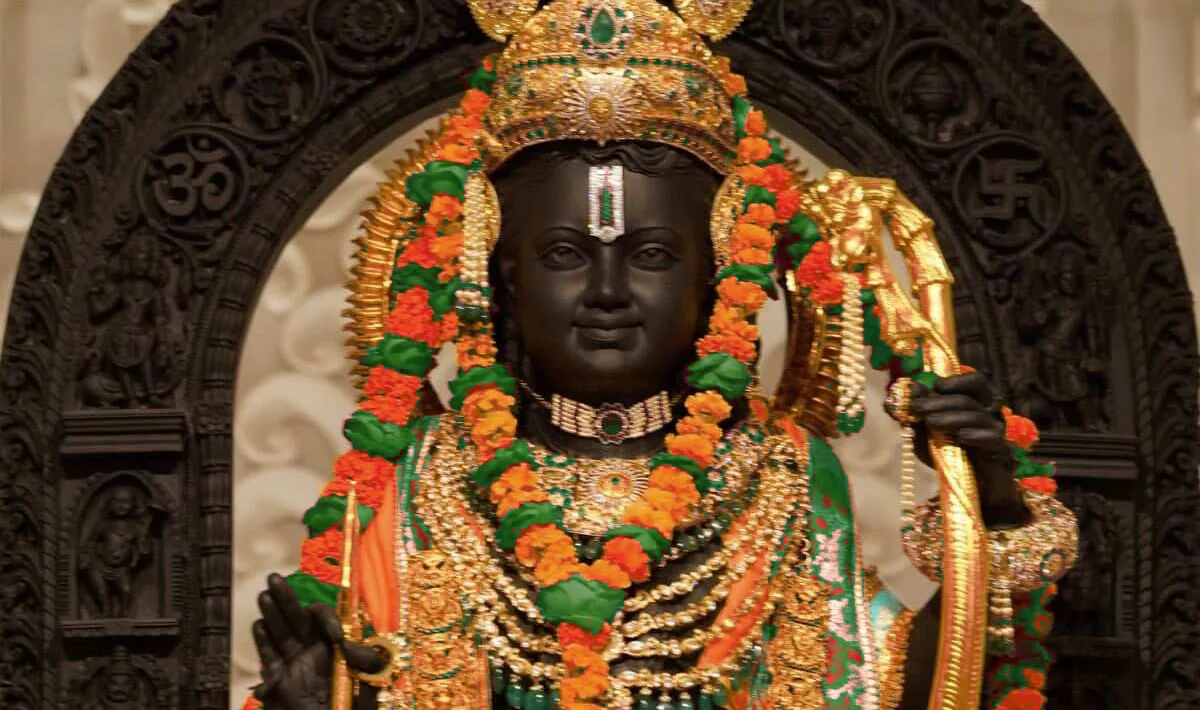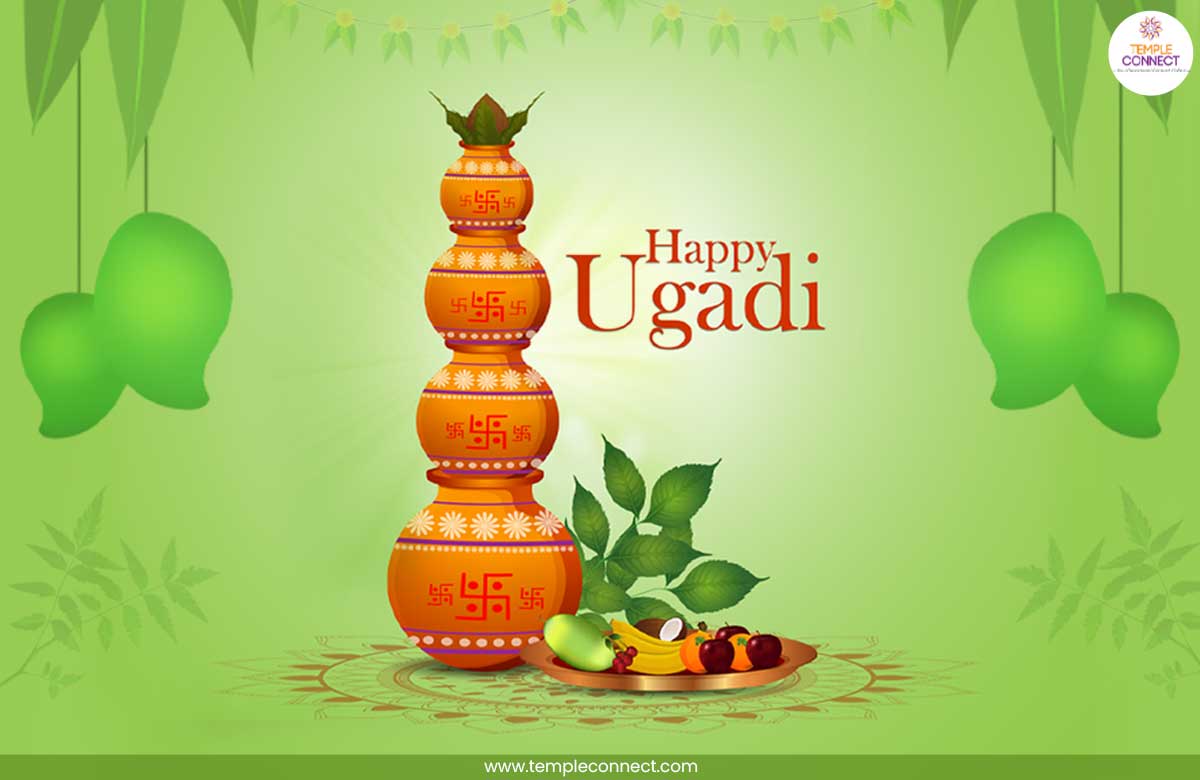Gudi Padwa is celebrated as the New Year’s Day in Maharashtra and Konkan region of Western India. It marks the beginning of the year as per the Hindu calendar and falls on the first day of the Chaitra month, which, as per Gregorian calendar, is March end of April beginning.
Gudi Padwa
Gudi Padwa or Samvatsar Padvo, is celebrated as the new year in Maharashtra and Konkani regions in India. Samvatsar is the cycle of 60 years and on Gudi Padwa, this cycle starts. Gudi Padwa, the springtime festival that marks the beginning of the new year as per Hindu Calendar or the solar-lunar calendar, is celebrated as one of the most auspicious days in Maharashtra, Goa and also in the Union territory of Daman. The name Gudi Padwa is derived from two words, ‘Gudi’ meaning flag and ‘Padwa’ originating from the Sanskrit word ‘pratipada’ which means the first day of lunar fortnight which appears after Amavasya. People all across Maharashtra, Goa and Daman, celebrate this day with enthusiasm, making rangolis and a special dhwaja called a Gudi Dhwaja which is like a flag made of flowers, mango and neem leaves tied on top of an upturned steel or copper vessel. People get to the streets in procession, dancing and welcoming the new year with full enthusiasm. Special festive dishes are prepared at home and offered to the home deity as Prasad before consuming it. The festival is celebrated in the Chaitra month on Shukla Paksha, which marks the first day of the new year as per Hindu calendar. It is the spring festival which indicates the end of rabi crop and beginning of the reaping of mangoes and other fruits. The festival is also celebrated in South India, but with a different name, Ugadi.
Deities worshiped during the festival
Gudi Padwa is associated with not one, but many deities and people worship many forms of Supreme energy on this day, including Bhagwan Brahma, Bhagwan Shiva and Bhagwan Vishnu.
Origin of the Festival
According to the Luni-Solar calendar, the Hindu new year is celebrated on this day because it is believed to be the one on which Brahma recreated the universe and kaal or time. According to Brahma Purana, there was a raging war which led to annihilation of people and time. The world remained in darkness for a while after which Brahma recreated the Universe and restarted time, marking the beginning of Satyug. Hence it is celebrated as the day of new beginning or new year. According to some beliefs, Gudi Padwa is associated with the victory of Lord Rama over Ravana and the enthronization of Rama, thus starting a new era. Hence, symbolic to the victory flag that was hoisted in Ayodhya, people hoist the Gudi Dhwaja on this day.
The festival has a different philosophy for Maharashtrians, who celebrate this day as the victory of Chatrapati Shivaji Maharaj in freeing the kingdom from Mughal rule. The Gudi Dhwaj is thus hoisted representing the victory flag of Shivaji Maharaj.
Religious Significance
The festival holds great importance for all streams of Hindu beliefs as it marks new beginnings. People hoist the Gudi outside their homes to ward off evil forces and invite prosperity and good luck. Some communities come together to hoist a sarwajanik Gudi Dhwaja and carry it to the local Shiva temple, praying and desiring social and communal prosperity and unity.
Customs, Traditions and Rituals
Gudi Padwa, as the name suggests, is celebrated by hoisting a gudi or flag on the first day of Chaita maas. People celebrate it with great enthusiasm and engage in several rituals, making the festival grand in its own way.
- On this auspicious day, people begin with washing their aangans or courtyards, clean in order to give a warm welcome to the new year. In villages, people still plaster their homes with cow dung.
- Women and children together beautify their homes to welcome the new year, with vibrant and attractive rangoli, which are beautiful patterns and designs made on the floor with color powder. They create magnificent designs of geographical patterns, motifs of fish, bird and other animal forms and auspicious and religious symbols like Swastika, Kalash and Om sign. People with great creative and artistic skills also make figures of Shiva and Vishnu, making their home entrances look celestial.
- People take oil baths as a ritual on this day and dress in traditional clothes, with men adorning Kurta Pyjama and women in sarees. Girls wear churidars or traditional skirts called lehengas. Women in Maharashtra wear saree in their traditional style where it looks like half dhoti and half saree. They accessorize themselves with mogra flowers and a golden nose pin. They also wear golden earrings which are tied up to the hair with the help of a golden chain that is attached to the earrings. Many men and women tie a turban around their head with a saffron coloured cloth, especially in Maharashtra.
- People prepare a dhwaja or a flag, called Gudi, using a rich silk or brocade cloth, tying it to a steel or copper vessel turned upside down. This is then tied to a bamboo, making it a beautiful flag. They then decorate it with Neem and Mango leaves and beautiful flowers, adding to the sight of the dhwaja. This dhwaja or Gudi represents the symbol of victory. They first carry it to the local Shiva temple and then hoist it in the entrance or windows of their house, symbolizing victory of good over evil. And as a guardian that waives off all evil forces.
- Some villages or communities host sarwajanik or community Gudi Kavad which is taken to the temple in a procession, with people singing and dancing, celebrating the new beginning. For hill top temples, people come together to place the Kavad on the top.
- The Gudi hoisting is the most important part of the celebration, after which they pray to Brahma, thanking for the new beginning and seeking blessings for good luck and time ahead.
- They then perform a special ritual of breaking the coconut kept in the Gudi, by making a human pyramid. This ritual is carried on only by male members of the family.
- People then consume neem leaves, either directly or in the form of a paste made by mixing grinded leaves in jaggery. This ritual marks the commencement of the new year.
- The festival is a feast in itself with special dishes prepared to celebrate the day. Puran Poli, Shrikhand, Puri and Chana are the mandatory delicacies prepared on this day. The menu becomes elaborate with more sweets added to it.
- The festival adds excitement to life as it is a day of family gatherings. All siblings and relatives come together to celebrate this day sharing good wishes and regards.
Celebration across India
Marking the beginning of the Hindu new year, this festival is celebrated across the country in different names and some changes in the rituals.
Ugadi – Andhra Pradesh, Telangana and Karnataka.
Bihu – Assam
Navreh – Kashmir
Cheti Chand – Sindhi community
Vishu – Kerala
Not all Hindu communities consider this day as a new year because the Hindu calendar is of two types, one, the Luni-Solar calendar which defines days as per the position of moon and sun and the other is Solar calendar which defines days as per the position of sun alone.
Temples celebrating Gudi Padwa
Many temples across India celebrate Gudi Padwa as one of their annual celebrations. Some of them are:
Renuka Mata Mandir
Saptashringhi Mandir
Tuljha Bhavani Mnadir
Benefits of celebrating the festival
Gudi Padwa is symbolic of love between couples. The newly wed bride is called for lunch with her husband to her mother’s home.
Sowing seeds on this day is considered auspicious as it is the time to start new reaps.
People believe it to be auspicious to start new ventures or buy new assets on this day.
Celebrating the festival in a way negates all negative feelings amongst people and marks the beginning of a new and positive phase in life.





One Response
Happy gudipadva navvarsh ki hardik shubhkamnay aap sabhi ko 🌹🙇🏻♀️🙇🏻♀️🙏